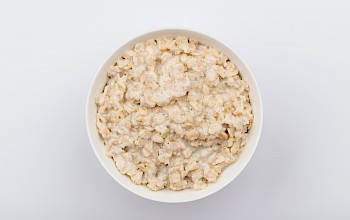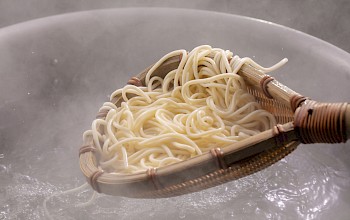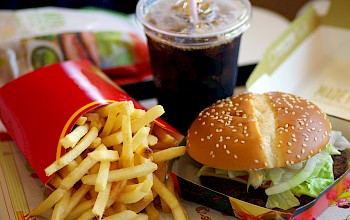Pretzel: Calories and Nutrition Analyse
How many calories in pretzel?

Nutrition Facts
PretzelServing size:
medium size pretzel (30 g) change
5g10g15g20g30g40g50g60g80g100g120g140g160g180g200g220g250g300g350g400g450g500g600g700g800g900g1000g
1oz2oz3oz4oz5oz6oz7oz8oz10oz12oz15oz20oz25oz30oz35oz40oz50oz
Amount Per Serving:
100g of pretzels contain about 384 calories (kcal).
Calories per:
ounce
| one pretzel
For instance, a medium size pretzel (30 g) contain about 115 calories.
This is about 6% of the daily caloric intake for an average adult with medium weight and activity level (assuming a 2000 kcal daily intake).
Scroll down for details and nutrition tables.
To visualize how much 115 kcal actually is, keep in mind that the calorie content of pretzel is similar to that of, for example:
- 2 apples
- 1 glass of Coca Cola (220 ml glass)
- 1 slice of cheese
- 1 slice of bread
- 0.5 glass of milk
- 6 cubes of sugar
Take a quick look at the tables below for detailed information about pretzel nutrition.
100g of Pretzel
Nutrition
- Calories384
- Carbs Total80.39 g
- Dietary fiber3.4 g
- Fat2.93 g
- Protein10.04 g
- Water3.13 g
Vitamins
- Vit B1 (Thiamine)0.424 mg
- Vit B2 (riboflavin)0.332 mg
- Vit B3 (Niacin)5.27 mg
- Vit B60.074 mg
- Vit B9 (Folic acid)0.166 mcg
- Vit C2.1 mg
- Vit E0.47 mg
- Vit K0.003 mg
Minerals
- Potassium223 mg
- Phosphorus2.8 mg
- Magnessium29 mg
- Calcium27 mg
- Sodium1240 mg
- Iron4.58 mg
- Zink2.8 mg
Discover the Nutritional Value of Pretzels: A Tasty Snack with Surprising Benefits
When it comes to snacking, pretzels are a popular choice around the globe. Known for their distinctive knot-like shape, crunchy texture, and savory flavor, pretzels are more than just a delicious treat. They also offer a range of nutritional benefits that might surprise you. Whether you're enjoying a soft, warm pretzel from a street vendor or munching on the crispy, baked variety, understanding the pretzel calories, pretzel nutrition, and their role in a healthy diet can help you make informed snacking choices.
Calories and Macronutrients in Pretzels
One of the first things people look at when considering the nutritional value of food is its calorie content. Pretzels, with an average of 384 calories per 100 grams, can fit into a balanced diet when consumed in moderation. But calories tell only part of the story. The macronutrient composition of pretzels—carbs, protein, and fat—is equally important.
- Carbohydrates: At approximately 80.39 grams per 100 grams, pretzels are a high-carb snack. This includes a modest amount of fiber (3.4 grams), which can aid in digestion and provide a feeling of fullness.
- Protein: Pretzels contain about 10.04 grams of protein per 100 grams, making them a decent source of this essential macronutrient.
- Fat: With only 2.93 grams of fat per 100 grams, pretzels are a low-fat snack option. This includes a negligible amount of saturated fat, making them a heart-healthy choice.
Minerals and Vitamins in Pretzels
Beyond macronutrients, pretzels offer a variety of minerals and vitamins that contribute to a balanced diet. They are a good source of iron (4.58 mg), which is crucial for transporting oxygen in the blood, and magnesium (29 mg), which supports muscle and nerve function. Pretzels also provide potassium (223 mg), necessary for heart health, and are rich in B vitamins like niacin (vitamin B3, 5.27 mg), which helps convert food into energy.
Considerations for a Healthy Diet
While pretzels can be a nutritious snack, it's important to consider their sodium content. With 1240 mg of sodium per 100 grams, pretzels are high in salt, which can contribute to high blood pressure if consumed in excess. Opting for low-sodium varieties or enjoying pretzels in moderation can help mitigate this concern.
Additionally, the high carbohydrate content means pretzels can raise blood sugar levels, which is something individuals with diabetes or those watching their blood sugar might need to consider. Pairing pretzels with a protein-rich dip or a serving of vegetables can help balance the meal and slow the absorption of sugars.
Conclusion
Pretzels are more than just a tasty snack; they offer a range of nutritional benefits, from protein and fiber to essential vitamins and minerals. However, their high sodium and carbohydrate content means they should be enjoyed as part of a balanced diet. By understanding the pretzel calories, pretzel nutrition, and how they fit into your dietary needs, you can enjoy this beloved snack without compromising your health goals.
How many calories are there in 1, 2, 3, or 5 servings of pretzels?
- Medium size pretzel (30 g)115 kcal
- Ounce (oz) of pretzels109 kcal
- Half of medium size servings of pretzel57.5 kcal
- Small size serving of pretzel (24g)92 kcal
- Big size pretzel (39g)149.5 kcal
- Two medium size servings of pretzels230 kcal
- Three medium size servings of pretzels345 kcal
- Four medium size servings of pretzels460 kcal
- Five medium size servings of pretzels575 kcal
Compare pretzel:
pretzel vs bread, pretzel vs kaiser roll, pretzel vs toast, pretzel vs baguette, see all compares of pretzel.

Similar calories number have:
See also:
Read this:
- How many calories does beef have?
- Calories in a half of caramel apple
- Calories in whole caramel apple
- Calories for one, two or more caramel apples
- Calories in slice of caramel apple
- How many carbs (carbohydrates) in ketchup packet?
- How much fat in Jelly Bean?
- How much protein in peanut butter toast?
- What is weight of Key Lime pie?
- Chocolate chips calories per ounce (oz)
- Sriracha sauce calories per serving size



Add comment